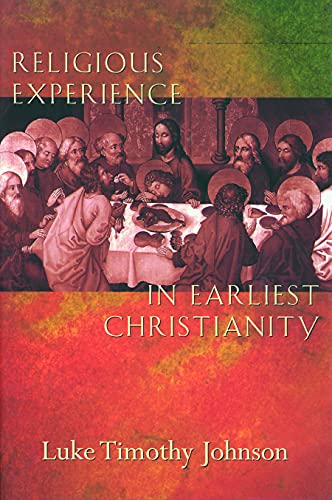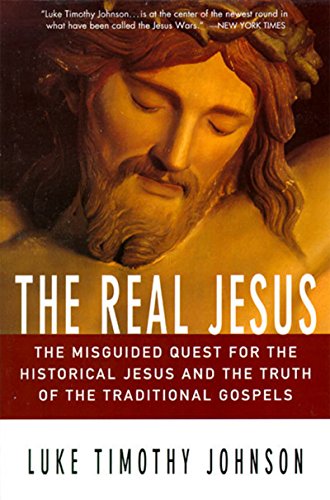luke tmothy johnson (2 résultats)
Type d'article
- Tous les types d'articles
- Livres (2)
- Magazines & Périodiques
- Bandes dessinées
- Partitions de musique
- Art, Affiches et Gravures
- Photographies
- Cartes
-
Manuscrits &
Papiers anciens
Etat
- Tous
- Neuf
- Ancien ou d'occasion
Reliure
- Toutes
- Couverture rigide
- Couverture souple
Particularités
- Edition originale
- Signé
- Jaquette
- Avec images
- Sans impression à la demande
Pays
Evaluation du vendeur
-
Religious Experience in Earliest Christianity
Edité par Fortress Press, 1998
ISBN 10 : 0800631293ISBN 13 : 9780800631291
Vendeur : JPH Books, Chapel Hill, NC, Etats-Unis
Livre
Soft cover. Etat : Good. Trade paperback. A few pp have underlining.
-
The Real Jesus: The Misguided Quest for the Historical Jesus and Truth of the Traditional Gospels
Edité par HarperSanFrancisco/ An Imprint of HarperCollins, Publishers, Inc., New York, 1997
ISBN 10 : 0060641665ISBN 13 : 9780060641665
Vendeur : gearbooks, The Bronx, NY, Etats-Unis
Livre
Trade Paperback. Etat : Like New. Adrian Morgan/ Red Letter Design (Cover Design); Marc Tedeschi (Cover Photo) (illustrateur). 182 pp. Flawless book except for extensive notes in ink. Synopsis: The title is "The Real Jesus: the Misguided Quest for the Historical Jesus and the Truth of The Traditional Goispels." This book has the four absolute uppermost qualities we seek in books: 1) excellence in content, 2) literary quality, 3) appealing design, and 4) significance of contribution. What happens when you take Jesus out of church? What happens when you examine the gospel stories not merely as spiritual documents but as historical ones? When you see Jesus naturalistically, as a human being living in and interacting with society? If you are a Christian, what does that do to your faith? Thomas Mann once wrote, "To separate Church and religion means to give up separating the religious from madness." Something like this fear seems to motivate Luke Timothy Johnson's The Real Jesus. Besides being a New Testament scholar, Johnson is a laicized Catholic priest and former Benedictine monk, and this perspective colors his withering critique of the field of historical Jesus studies. He doesn't like this broad, unwieldy, interdisciplinary movement, this unorchestrated effort by historians, archaeologists, anthropologists, and others to find scraps of information about a certain human being who lived in Palestine two millennia ago. Professor Johnson's basic complaint is that this work is going on in the hurly-burly of society at large rather than in the sheltered cove of "the church and the academy," where he believes it belongs. This is very much in line with traditional Catholic thinking. Historically, the Church has placed itself and its representatives in an intermediary role, with the task of translating the language of the Divine into a form that ordinary humanity can comprehend - the middleman between God and the people. But this historical-Jesus business hasn't followed those rules. To the bewilderment of biblical scholars, who are used to being ignored by everyone except their colleagues, ordinary people have been buying their books, sifting through their arcane arguments, attending lectures, buttonholing scholars who appear on radio talk shows. People are grappling with the issues on their own. And they are very big issues indeed. For the whole approach of critical scholarship is naturalistic: It presumes that the Jesus of history came into and left this world according to the same natural forces that govern the rest of us. Such theologically charged concepts as the virgin birth and the bodily resurrection are seen by this scholarship as not literally true, and in fact the Bible sleuths think they have an angle on where and when these mythic overlays were added to the Jesus story. This is not to say that historical Jesus scholarship dismisses the truth of Christianity; many of these scholars (including the many who, like Professor Johnson, are or have been Christian clerics) insist that their work does not dispel the gospel portrait but rather shows the limitations of our modern consciousness, which tends to equate "truth" with scientific or literal truth. This is where Professor Johnson's book is helpful. He considers the media attention paid to the historical Jesus, and especially to that media-savvy group, the Jesus Seminar, to be a mirror image of the attention given to so-called Christian fundamentalism in the 1970s and 1980s. In both cases delicate nuances of spirituality and philosophy are reduced to sound bites. Thus anyone with a passing interest is likely to be misled or confused. This is a valuable point. What this field is tinkering with is our culture's definition of truth, and attempting to alter something so fundamental requires a lot of work and careful attention. Professor Johnson himself, for example, whom scholars I have spoken with regard as a theological conservative, has a view of the resurrection that does not seem very conservative to me, and which demands a great deal of attention. If I understand him, he does not believe in a l.



